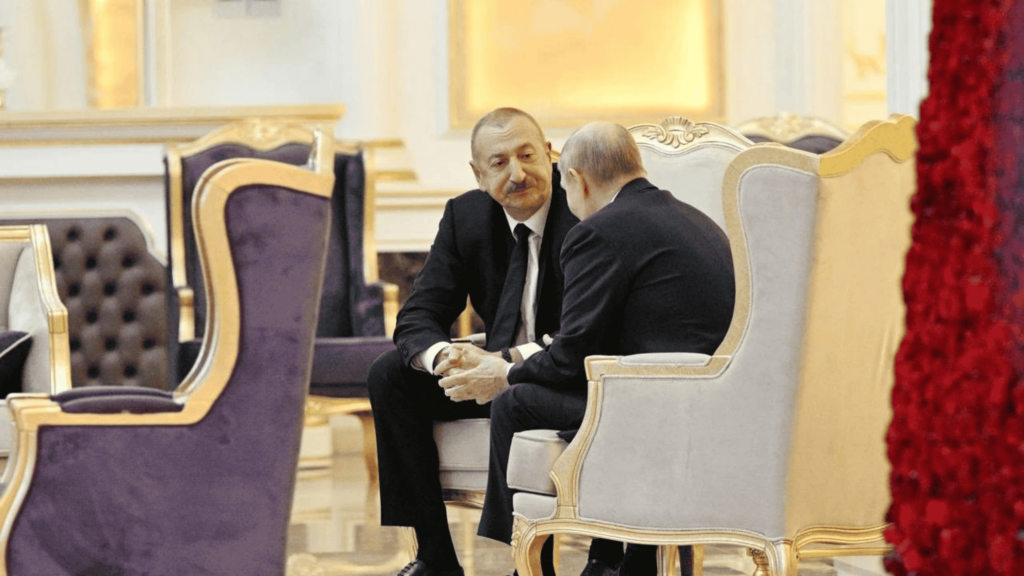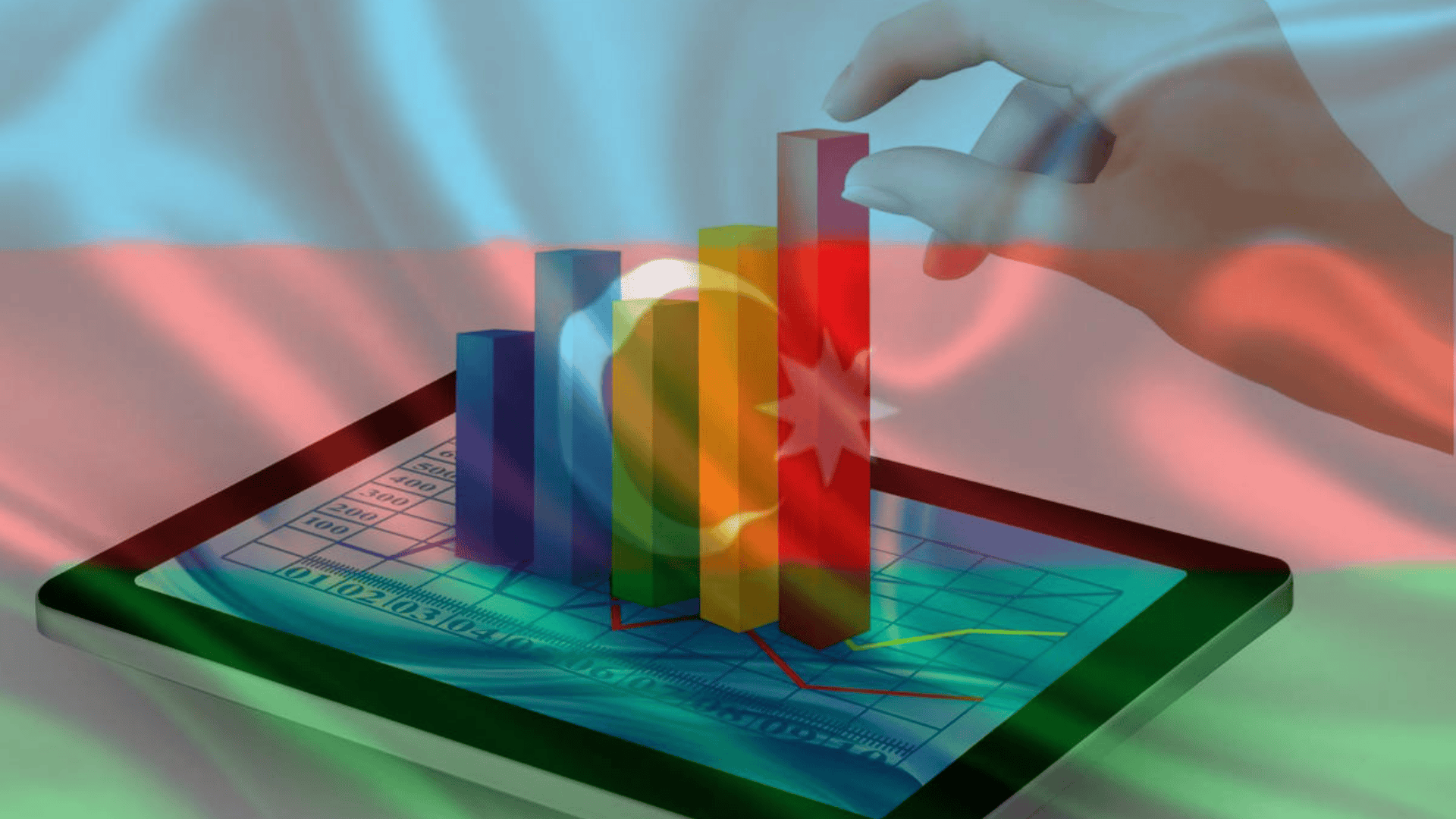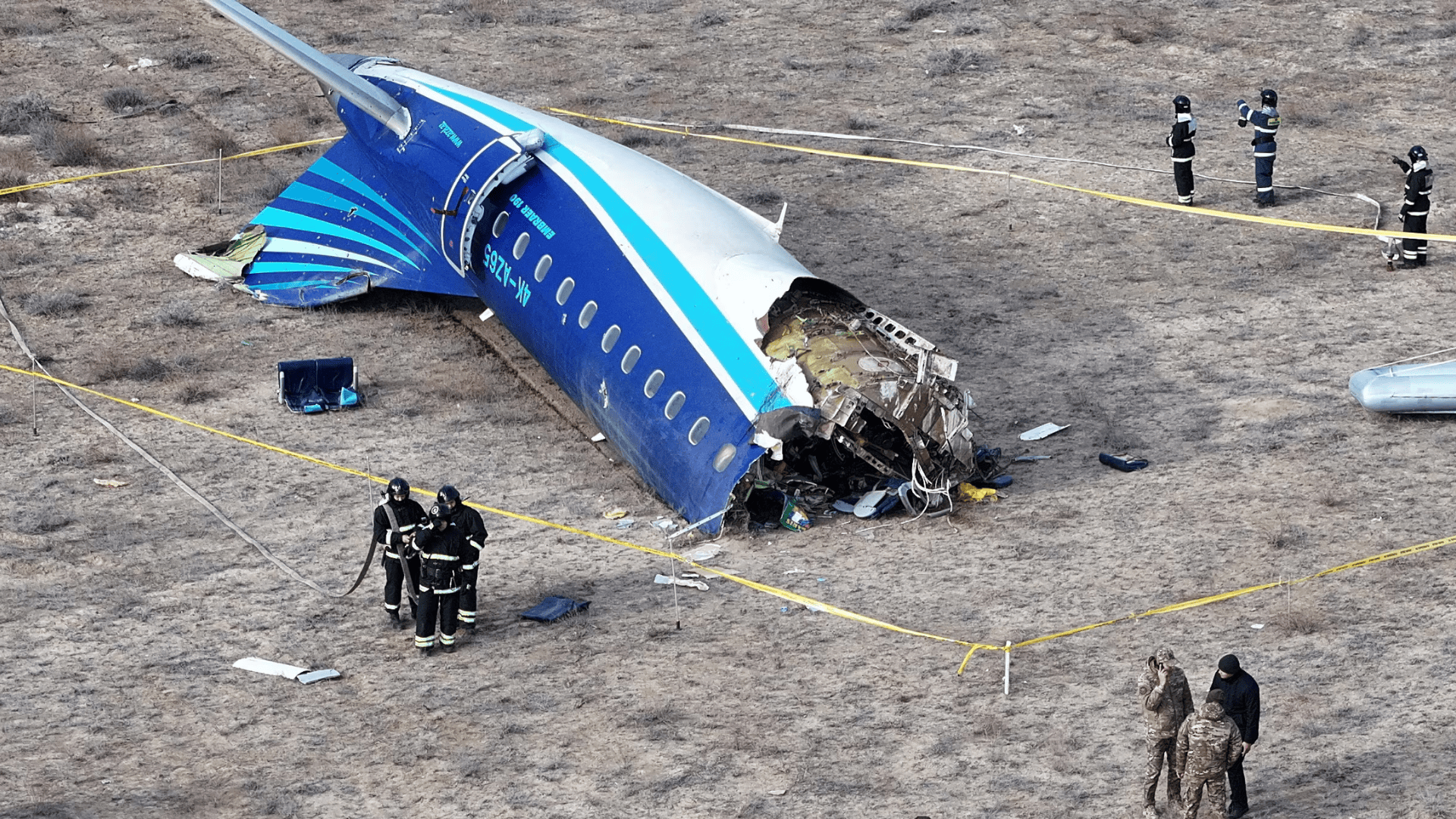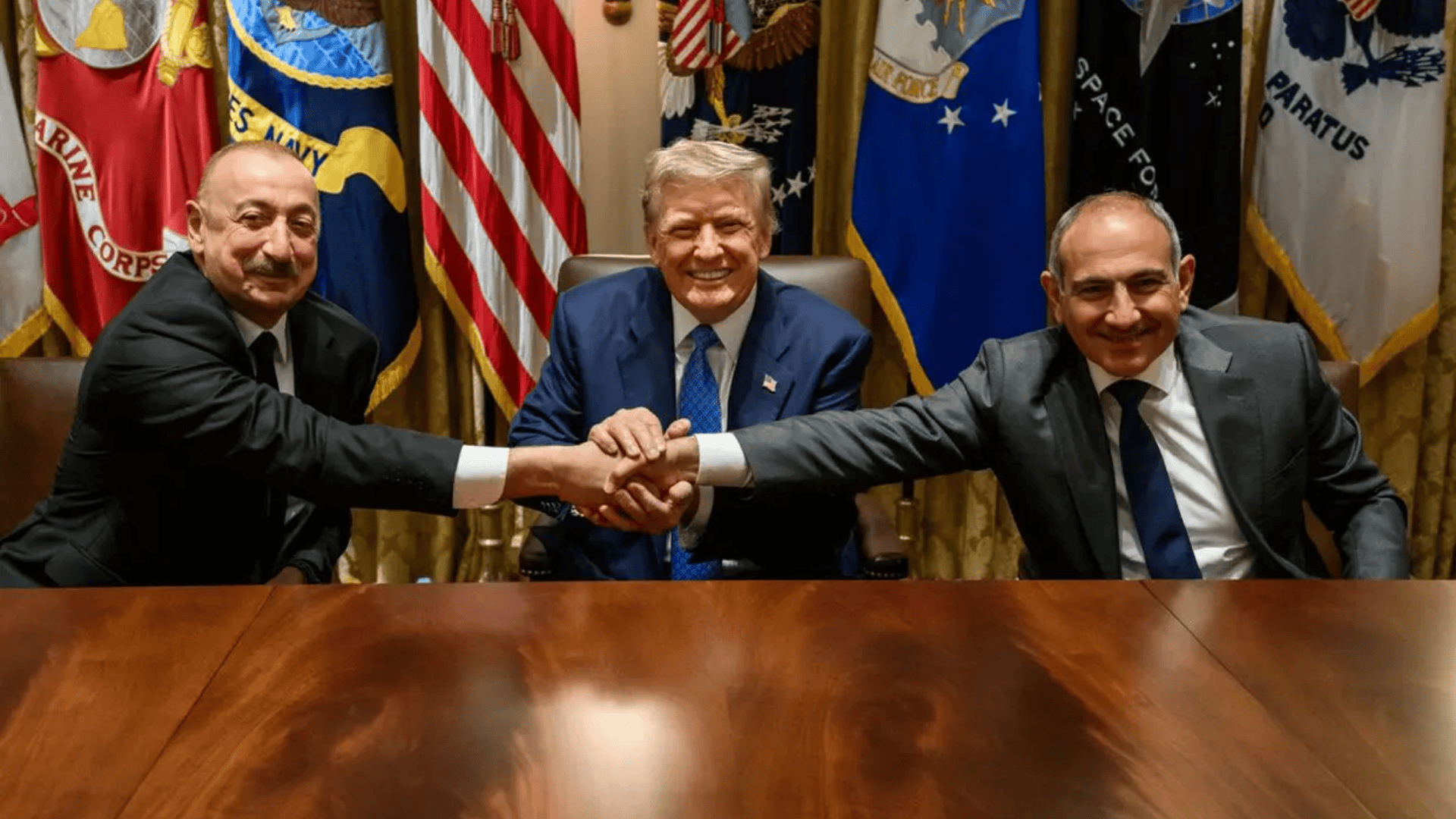Aliyev and Putin meet against backdrop of AZAL crash and PEACE Act bill
Aliyev–Putin meeting, Dushanbe
At the CIS summit in Dushanbe, a long-awaited meeting took place between Azerbaijani President Ilham Aliyev and Russian President Vladimir Putin.
The encounter is seen as a significant step in easing the rising tensions between the two countries over the past year. The dialogue between Aliyev and Putin drew particular attention against the backdrop of the crisis triggered when an Azerbaijani passenger plane was shot down in Russian airspace at the end of 2024.
The dialogue between Aliyev and Putin drew particular attention against the backdrop of the crisis that erupted after an Azerbaijani passenger plane was shot down in Russian airspace in December 2024. Baku had consistently demanded that Moscow issue an official apology, hold those responsible accountable, and provide compensation to the families of the victims.
Tensions escalated further in June when Russian special forces carried out an operation targeting local Azerbaijanis in Yekaterinburg, resulting in the deaths of two people and the detention of around ten others amid extreme violence. Soon after, numerous members of the Azerbaijani diaspora were arrested, with some subsequently deported.
At the same time, the US Congress introduced the PEACE Act (H.R.5632), proposing sanctions in the event of potential Azerbaijani military action against Armenia, giving the meeting added geopolitical significance.
This analysis examines the official topics discussed in Dushanbe, the reasons behind recent strains in Baku-Moscow relations, behind-the-scenes aspects of the talks, and the broader context of the US legislation under consideration.
- PEACE Act or “Armenian lobby”? A bill has been introduced to US Congress to sanction Azerbaijan if it attacks Armenia
- Contaminated crude and Moscow’s shadow: inside Azerbaijan’s energy turmoil
- Kremlin’s soft power plan for Azerbaijan: “Hundreds of millions of dollars wasted”
Official agenda: plane crash and signals of cooperation

At the official session in Dushanbe, the main focus was the AZAL passenger plane incident, shot down by Russian air defense systems in December 2024. Vladimir Putin acknowledged responsibility for the tragedy, explaining that two Russian missiles exploded near the AZAL aircraft due to a “technical malfunction,” and reiterated his apologies for the “tragic accident” that claimed 38 lives.
Putin promised that Russia would “take all necessary measures” to compensate the families of the victims and hold responsible officials accountable.
President Ilham Aliyev, in turn, thanked Putin for personally overseeing the investigation and praised the open discussion of such a sensitive issue during the meeting. According to Aliyev, Baku had from the outset believed that Russia would conduct an objective and thorough investigation, and the detailed clarifications provided by Putin would be positively received by Azerbaijani society.
At the same time, the leaders conveyed optimistic signals regarding the overall state of bilateral relations.
Putin stated that, despite the tragedy and its “certain nuances,” trade and economic ties between Russia and Azerbaijan continue to develop successfully.
He noted that last year’s trade turnover grew by 6%, and in the first months of this year, it had already increased by more than 16%. He also emphasized the continued high level of humanitarian contacts and recalled the 2022 Declaration on Allied Cooperation, reaffirming commitment to its key provisions.
President Aliyev highlighted that trade growth in 2025 continues steadily, with no declines in any sector. On the contrary, all previously agreed “roadmaps” are being successfully implemented. He also mentioned a recent expanded meeting of the bilateral intergovernmental commission, where discussions were, in his words, “broad and positive in nature.”
Both leaders expressed hope that their joint public statements following the meeting would be seen as a constructive step toward normalizing relations.
Closed-door talks: versions and behind-the-scenes deals
Beyond the official statements, reports suggest that the closed part of the meeting between Aliyev and Putin focused on several sensitive issues.
According to sources, amid a wave of mutual arrests in recent months, particular attention was paid to the fate of detained citizens.
Observers believe Moscow demanded the release of its nationals — including a Russian journalist and others arrested in Azerbaijan on espionage charges.
Indeed, shortly after the talks, Azerbaijan released Igor Kartavykh, editor-in-chief of Sputnik Azerbaijan.
Around the same time, it was reported that Russia had freed Azerbaijani citizen Mamedali Aghayev.
These reciprocal moves reinforced speculation about an informal agreement — a “quiet exchange of hostages.”
The talks are also believed to have touched on the case of the son of Shahin Shykhlynsky, head of the Azerbaijani diaspora in Russia’s Ural region, as well as other members of his family currently held in Russia. This issue was reportedly raised as a humanitarian concern.
Another likely topic of the closed discussions was the status of so-called “pro-Russian figures” within Azerbaijan’s ruling elite.
Over the years, several senior officials traditionally associated with Moscow have retained influence in Baku — among them former presidential administration chief Ramiz Mehdiyev, First Deputy Prime Minister Yaqub Eyyubov, parliamentary speaker Sahiba Gafarova, and Security Council Secretary Ramil Usubov.
The Kremlin is known to be particularly sensitive about the fate of such loyal cadres.
Russian media have also noted that despite recent tensions, figures long within Russia’s political orbit continue to hold sway in Azerbaijan’s power structures.
In this context, it is possible that Putin sought assurances from Aliyev that pro-Russian political and social circles in Azerbaijan would not face persecution.
Issues that may have caused concern in Moscow reportedly included the potential closure of Russian-language schools and the suspension of cultural projects linked to Russia.
Amid the summer tensions between the two countries, several Russian cultural events in Azerbaijan were indeed postponed, and reports emerged of plans to shut down Russian-language schools.
It is likely that Putin urged Baku to act cautiously on these matters and to avoid undermining the bilateral humanitarian ties that remain one of the last stable pillars of Russian influence in Azerbaijan.
Against the backdrop of the U.S. Congress’s adoption of the PEACE Act
During the October meeting, another issue high on Baku’s agenda was the growing political signals coming from Washington.
On September 30, Republican congressmen Darrell Issa and Gus Bilirakis introduced the PEACE Act (Preventing Escalation and Advancing Caucasus Engagement Act) in the U.S. House of Representatives — a bill that envisions potential sanctions against Azerbaijan.
According to the document, if the U.S. president determines that Azerbaijan has committed a new “act of hostility” against Armenia, the following measures would be triggered:
- sanctions against senior Azerbaijani officials and associated individuals;
- financial restrictions targeting the oil and gas sector;
- additional penalties against those seen as obstructing the peace process.
Although the bill is still under discussion, it already carries significant political and economic risks for Azerbaijan.
Chief among them is the possibility that, in the event of renewed military escalation with Armenia, President Ilham Aliyev and his inner circle could become direct targets of U.S. sanctions — potentially leading to the freezing of overseas assets and restrictions on international travel.
The energy sector — Azerbaijan’s main source of income — could also come under pressure.
A refusal by foreign banks and investors to cooperate with the Azerbaijani oil industry would likely have a damaging effect on the country’s economy. In this sense, if enacted, the PEACE Act could become a powerful tool of economic and political leverage against Baku.
So far, Azerbaijani officials have not publicly commented on the bill. However, pro-government media and commentators were quick to denounce it as “biased, one-sided and unjust.”
Political observers in Baku described the initiative as an “instrument of the Armenian diaspora,” pointing to the congressmen’s history of lobbying in support of Armenia.
The timing of the PEACE Act’s discussion — coinciding with the Dushanbe meeting — appeared symbolic.
The geopolitical implication is clear: Baku now finds itself balancing between pressure from both Moscow and Washington.
On one hand, by holding direct talks with Vladimir Putin, Aliyev signalled his unwillingness to escalate tensions with Russia and his readiness to resolve existing disputes — a move also meant as a message to Washington that Azerbaijan is not seeking to distance itself completely from Moscow.
On the other hand, the threat of U.S. sanctions could push Baku toward even closer cooperation with the Kremlin. In effect, Azerbaijan is signalling that Western pressure will only strengthen its ties with Russia — underlining that the country will not be left without strategic options.
По сути, это часть геополитической игры балансов: Баку маневрирует между двумя In essence, this is part of a broader geopolitical balancing act: Baku is manoeuvring between two major powers, seeking to extract political guarantees and strategic advantages from each.
Aliyev–Putin meeting





















